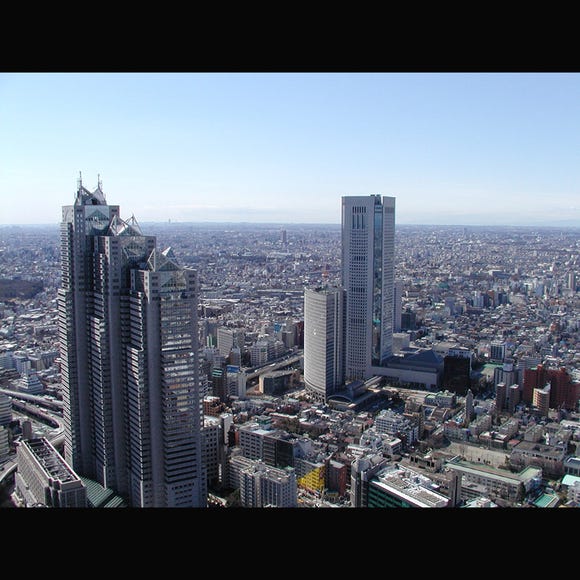
Essential Japanese Phrases for Travel – 52 Weirdly Useful Expressions You Can Use Right Away
- Written by: Yoko
- Translated by: Krys Suzuki
When visiting Japan, there are several useful phrases you should probably know, as there may not be many Japanese people who speak English very fluently. But with these key phrases, whether shy or famous, any Japanese-speaking person you talk to will be sure to understand you.
Let’s look at some commonly used expressions for situations you may encounter when visiting Japan in the following example sentences, along with their meanings and usage.
Basic Greetings and Responses
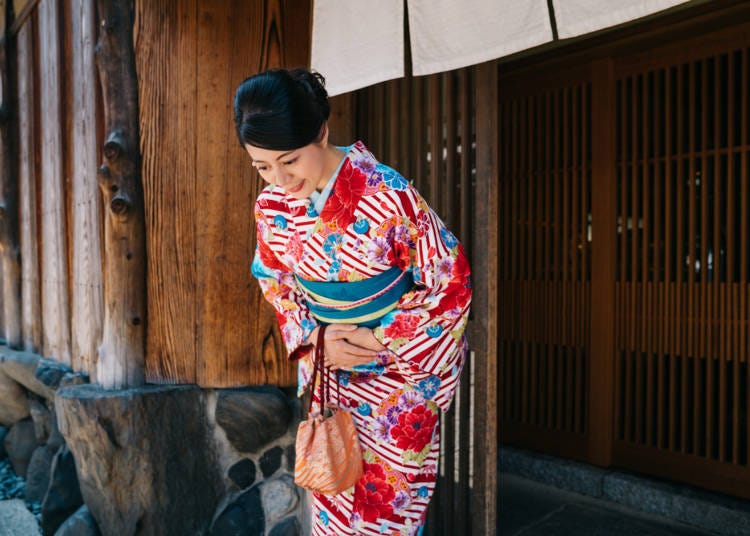
The following are some essential, must-know phrases when communicating with Japanese people.
1. Ohayou-gozaimasu (おはようございます): Good morning
2. Kon’nichiwa (こんにちは): Hello (during daytime only)
3. Konbanwa (こんばんは): Good evening/hello (during evening/night)
In Japan, the words used in greeting vary depending on the time of day: morning, noon/daytime, and evening/night. In the mornings, say “Ohayou-gozaimasu” (lit. ‘Good morning), during the day say “Kon’nichiwa,” and in the evening/at night, “Konbanwa” (lit. ‘Good evening’).
4. Arigatou gozaimasu (ありがとうございます): Thank you
This is a phrase to express thanks and gratitude. You can shorten the phrase to “arigatou” in a casual situation, but “arigatou gozaimasu” is more polite. If somebody tells you “Arigatou gozaimasu,” you can reply with “Dou itashimashite (どういたしまして),” or “You’re welcome.”
5. Hai (はい): Yes
6. Iie (いいえ): No
Use “hai” as a positive/affirmative response in conversation. To deny or negate, say “iie,” or “no.”
7. Sumimasen (すみません): Excuse me
This useful phrase can be used as both an apology and as thanks, as well as to address a stranger or unfamiliar person. Its nuance is quite similar to the English equivalent “excuse me.”
Asking for Directions in Japan
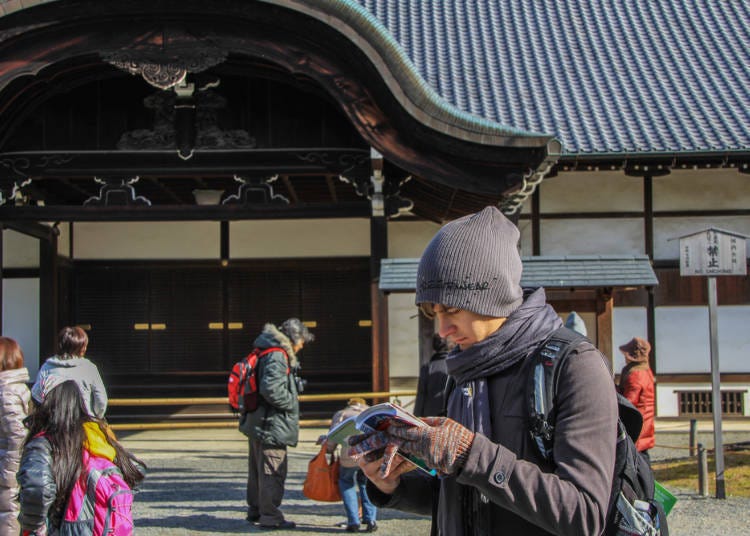
Here are some useful phrases for if you happen to lose your way. Even if this is the only thing you are able to say in Japanese, it will be much easier for someone to help you out.
8. O-tazune shite mo ii desu ka? (おたずねしてもいいですか?): May I ask you a question?
When asking someone for directions, this is a good phrase to begin the interaction with. Alternatively, you can use the previously mentioned “Sumimasen” (Excuse me). If they can help you, they will probably respond, “Hai, ii desu yo” (Yes, that’s fine), and stop to help you. But if they say “Gomen nasai” or “Sumimasen” (both meaning “I’m sorry”), they may not be able to help you, so thank them and look for someone else to ask.
9. ~ wa doko desu ka? (~はどこにありますか?): Where is ~?
Use this expression to ask the location of your destination. Insert the name of the place you’re looking for where indicated by the ~.
10. Chizu o kaite moraemasu ka? (地図を書いてもらえますか?): Can you please draw a map for me?
If you have trouble understanding directions that are given to you in Japanese, you can ask someone to draw you a simple map. “Chizu” is the word for map. If you have pen and a paper, you can politely hand it to them as you ask “Kaite moraemasu ka?” (“Can you please draw it?”)
11. Koko wa doko desu ka? (ここはどこですか?): Where is this?/Where am I?
If you get lost, or don’t know where you are, this expression is used to ask the name of the current location. “Koko” is the word for “here,” or your current location. If you have a map, you can show it to someone while asking this question so they can point out where you are.
Here are some other useful-to-know phrases:
12. Nihongo wa hanasemasen (日本語は話せません): I can‘t speak Japanese
This phrase lets the listener know that you cannot speak Japanese very well. You may want to ask the other person if they can speak English with the following phrase: “Eigo wo hanasemasu ka?” (“Can you speak English?”) “Eigo” means English. You can change the word “Eigo” to match your own language if different from English.
13. Mou ichido onegaishimasu (もう一度お願いします): Can you please say that again?
If you can’t hear or understand the other person’s reply the first time, you can ask them to repeat it with this phrase. It is also helpful to remember the phrase “Dou iu imi desu ka?” (“What does (it/this/that) mean?”)
Checking In and Asking Questions at Hotels and Ryokan

Although English has become more widely available in many accommodation facilities, there may be some that are not as convenient for foreign visitors, such as a lack of multilingual staff and signs. But if you remember the minimum required Japanese phrases below, you will be able to access a greater range of facility options safely and with greater convenience.
14. Check-in (Check-out) o onegai-shimasu (チェックイン(チェックアウト)をお願いします): I would like to check-in/check-out
When you are ready to check in or out, simply call out to the hotel staff with the words “Onegai-shimasu,” which means “Please.”
15. Aiteiru heya wa arimasu ka? (空いている部屋はありますか?): Are there any rooms available?
If you have not made a reservation beforehand, use this phrase to ask if there is a vacant room, or “aiteiru heya.” When there are no rooms available, they may respond “manshitsu,” or “full rooms.”
16. Kore wa nan no ryokin desu ka? (これは何の料金ですか?): What is this charge for?
Some accommodations may have their own unique rates and fee systems, which can be confusing. Use this phrase if you find an unknown charge, or want to know what a certain charge is for.
17. Daiyokujou wa doko desu ka? (大浴場はどこですか?): Where is the public bath?
In Japan, there is a large public bathing area called “daiyokujou,” which is shared with other guests. Some places even have an open-air bath (“rotemburo,” 露天風呂) where you can enjoy the scenery outside while you soak. You can ask where either of these areas are located with the question, “Daiyokujou/Rotemburo wa doko desu ka?” (Where is the public bath/open-air bath?)
18. Chizu wa arimasu ka? (地図はありますか?): Do you have a map?
Use this phrase to request a map you can use so you can walk around after checking in. You can ask for any item you need by asking the question, “~ wa arimasu ka?” (Do you have a ~?)
19. Chikaku ni o-susume no resutoran wa arimasu ka? (近くにおすすめのレストランはありますか?): Are there any recommended restaurants nearby?
If you can’t decide which restaurant to eat at, ask for a recommendation with this question. You can ask about various locations with the question, “Chikaku ni ~ wa arimasu ka?” (Is there a ~ nearby?)
20. Eigo no tsua wo shokai shite kudasai (英語のツアーを紹介してください): Please tell me about the English tour(s).
Some facilities offer various sightseeing tours for foreigner visitors. This is a phrase that can be used when looking for a sightseeing tour with English-speaking guides.
21. Heya ni kagi wo wasuremashita (部屋にカギを忘れました): I forgot my key in the room
If you forget your key in a room that auto-locks, use this phrase at the front desk to have them open it for you. You can replace the word “kagi” with any item you forgot to say the expression, “~ o wasuremashita.” (I forgot ~).
Ordering Food at a Japanese Restaurant
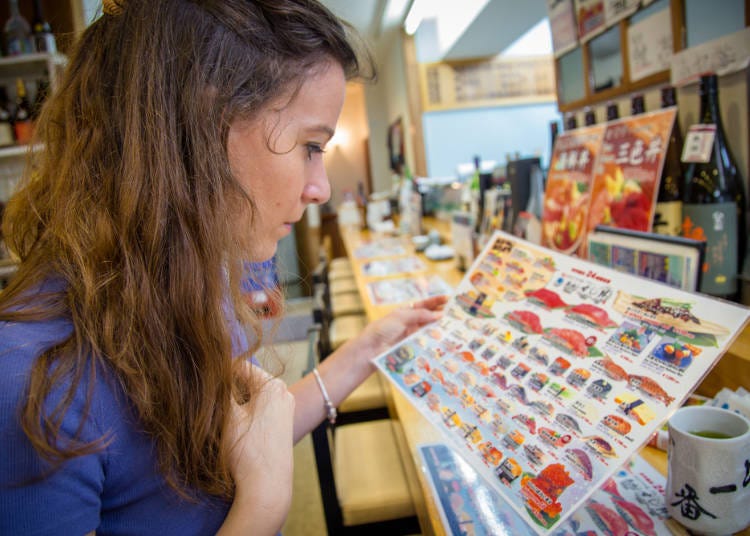
By learning how to order food in Japanese, you will be able to more thoroughly enjoy eating your Japanese meals. There are many restaurants where English may not be available, so it’s a good idea to study and use the phrases introduced below.
22. Menu o kudasai (メニューをください): Please give me a menu
Say this when you want to see the menu. You can change the word with whatever you want and ask “~ o kudasai” (Please give me ~). If you want to ask for an English menu, ask "Eigo no menu wa arimasu ka?” (Do you have an English menu?)
23. Chumon o onegashimasu (注文をお願いします): I’m ready to order
Once you have decided what you want to order, let the waiter know with this expression.
24. O-susume no menu wa dore desu ka? (おすすめのメニュ―はどれですか?): What menu item do you recommend?
If you don’t know which one to choose, or just want to know the staff-picked recommendations, you can use this phrase to ask them.
25. Kore wa nan desu ka? (これは何ですか?): What is this?
This is useful when you want to know what an ingredient is, especially if there are certain things you cannot eat. Use this phrase to ask about what you want to know, using the word “kore” to indicate “this.”
26. Kore o onegaishimasu (これをお願いします): I’d like (to order) this, please
You can easily order something by pointing to it on the menu and saying, “Kore o onegaishimasu” (I would like to order this).
27. Kohi wa tsukimasu ka? (コーヒーはつきますか?): Does it include coffee?
When ordering a set menu, they sometimes include coffee. You can ask whether they do or not with this phrase.
28. Mizu o onegaishimasu (水をお願いします): Please give me some water
In Japanese restaurants, it is common to serve free water to guests after they take their seats. You can also use this phrase “Mizu o onegaishimasu” (Please give me some water) if the water you were drinking has finished to ask for a refill.
29. Toire wa doko desu ka? (トイレはどこですか?): Where is the bathroom?
This is a convenient expression when asking the location of the restrooms in any place, not just in the restaurants.
30. Itadakimasu (いただきます): Phrase said before eating food
31: Gochisosama deshita (ごちそうさまでした): Phrase said after eating; also means “Thank you for the meal.”
In Japan, it is customary to say “Itadakimasu” before eating (literally, “I receive [the food]), and “Gochisosama deshita” (“Thank you for the meal”) when you are done eating. These both express gratitude to the people who prepared the meal, so please use to show your appreciation. It is also polite to say the expression “Gochisosama deshita” to the restaurants front staff before leaving.
32. O-kaikei o onegaishimasu (お会計をお願いします): Check please
This phrase is used when you are ready to pay after finishing your meal. In some places they will still bring you the check if you tell the staff the previous phrase, “Gochisosama deshita.”
Navigating Train Stations and Subways in Japan
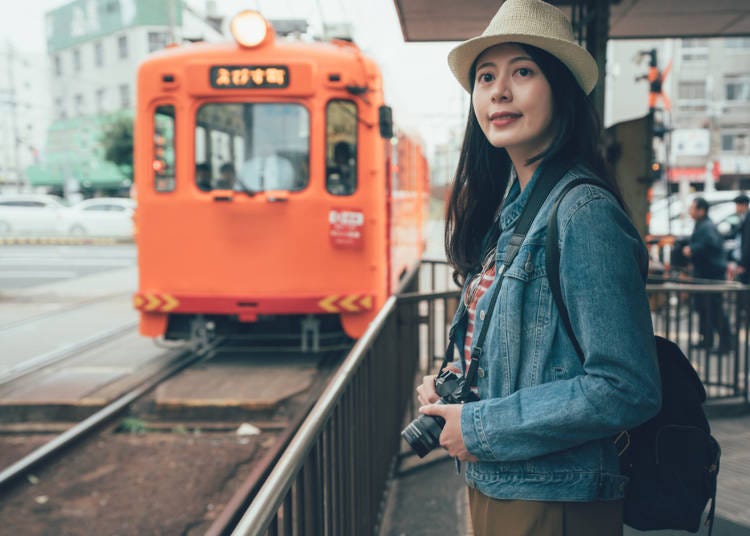
Trains are a convenient way to travel in Japan, but depending on the location, train routes and transfers can be complicated, making it easy to get lost. But if you remember these phrases, you can get around with ease.
33. Kippu uriba wa doko desu ka? (切符売り場はどこですか?): Where can I buy tickets?
Use this phrase when you want to know where the ticket window is, or where you can buy tickets. Tickets can be sold at automatic vending machines, as well as at the counter where the staff can help.
34. ~ made no kippu o kudasai (までの切符をください): Please give me a ticket to ~
When buying a ticket at the window, use this phrase and insert the name of your destination in the ~.
35. ~ ni wa dou ikeba ii desu ka? (にはどう行けばいいですか?): How do I get to ~?
If the route map is complicated and you can’t figure out where to transfer, you can ask for directions by using this expression and replacing the ~ with the name of the station you want to go to.
36. ~ yuki no densha wa dore desu ka? (行きの電車はどれですか?): Which train goes to ~?
This phrase is used to ask at which platform you can take your desired train. Replace ~ with the name of the station you are trying to reach.
37. Kono densha wa ~ ni ikimasu ka? (この電車は○○に行きますか): Does this train go to ~?
Use this to ask if the train you are on (or are asking about) goes to your desired station. Replace the ~ with the station name you want, and make sure you don’t accidentally take the wrong train.
38. Tsugi no ~ yuki wa nanji desu ka? (次の○○行きは何時ですか?): What time is the next train to ~?
Use this phrase to ask when the next train to your desired location will leave. Replace ~ with the name of the station.
39. Koko wa nan eki desu ka? (ここは何駅ですか?): What station is this?
If you do not know or cannot read the name of the station your train has arrived at, you can ask another passenger this question to check. When you want to know the name of the next stop, you can ask, “Tsugi wa nan eki desu ka?” (次は何駅ですか; “What station is next?”)
40. Orimasu (降ります): I’m getting off (bus or train)
If you arrive at your desired station but the train car is crowded, you can use this phrase to let other passengers know you are trying to get out.
Asking for Information at Tourist Spots
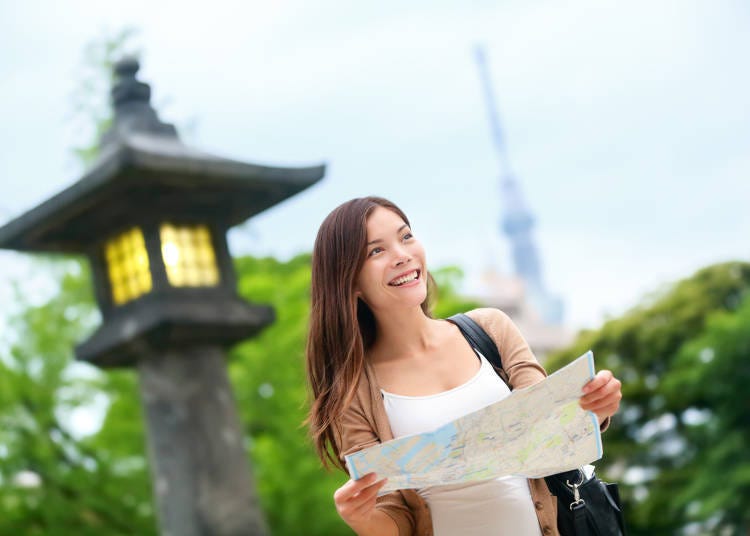
Speaking in Japanese may help you learn information in a way only obtainable by using the local language.
41. Kankou-annai-jou wa doko desu ka? (観光案内所はどこですか?): Where is the tourist information center?
This phrase is used to ask about the location of the tourist information center. The Tourist Information Center (kankou-annai-jou) has tons of helpful information for sightseeing.
42. Pamfuretto wa arimasu ka? (パンフレットはありますか?): Are there any brochures?
Use this phrase to ask for an information brochure with more detailed information on tourist attractions.
43. Shashin o totte mo ii desu ka? (写真を撮ってもいいですか?): May I take a photo?
This expression is used to ask for permission to take pictures. You can use it when asking if photography is allowed in a certain area, as well as to ask people if you can take a photo of or with them (such as when you want a photo of someone wearing a kimono).
44. Shashin o totte moraemasu ka? (写真を撮ってもらえますか?): Can you please take a picture (for me)?
This phrase is used when you want to ask someone to take a picture of/for you. Don’t forget to say “Arigatou gozaimasu,” or “Thank you,” to the person who takes the picture for you.
45. Takushii noriba wa doko desu ka? (タクシー乗り場はどこですか?): Where is the taxi stand?
Use this when looking for a spot you can catch a taxi. If looking for a bus stop, ask “Basu noriba wa doko desu ka?” (バス乗り場はどこですか?; "Where is the bus stop?")
46. Koko ni itte kudasai (ここに行ってください): Please go here
When taking a taxi, you can easily tell the taxi driver where you want by pointing out the location on the map and saying “koko,” or “here.” You can also replace “koko” in the expression with the name of a specific location (“~ ni itte kudasai”) to specifically tell the driver where you want to go.
Shopping in Japan

While some stores may have staff who can speak foreign languages in popular tourist destinations, most shops may only have staff who speak only Japanese.
47. Kore o misete kudasai (これを見せてください): Please show me this
Use this phrase to ask a clerk to show you a product in a display case.
48. Kichaku shite mo ii desu ka? (試着してもいいですか?): Can I try it on?
When clothes shopping, trying items on is called “kichaku.” Japanese clothes are often smaller than in the West, so it is a good idea to use this phrase and try them on before buying.
49. ~ wa arimasu ka? (はありますか?): Do you have ~?
Use this phrase to ask the store clerk for an item you are looking for. Replace the ~ with the name of the product you want.
50. Kore o kudasai (これをください): I’ll take this
Once you have decided on your items, use this expression to indicate what you want to buy.
51. Ikura desu ka? (いくらですか?): How much is it/this?
Use this phrase to ask the price of items. When you want to know the price of a specific item, you can point at it and ask “Ikura desu ka?” If you want to ask the total price of several items, you can ask “Zenbu de ikura desu ka?” (全部でいくらですか?; How much is all of this?)
52. Kurejitto kado wa tsukaemasu ka? (クレジットカードは使えますか?): Can I use a credit card?
If planning to use a credit card, you may want to ask this phrase in advance, before doing your shopping. Some stores do not accept credit cards.
By understanding and using these useful phrases, you are now well prepared to actively communicate with the Japanese locals during your visit to Japan. With these, you are sure to be able to create even more wonderful memories during your trip!
After working as a ground hostess and web director, she became an independent writer in 2013. She writes extensively on topics such as relationships, family issues, and Japanese culture. Airports and military bases are her favorite relaxation spots.
Krys is a 2023 MEXT Research Scholar currently residing in Kyoto, Japan. She graduated Magna Cum Laude with a BA in Japanese Translation and Interpretation via the CUNY Baccalaureate Program from Hunter College in New York City. After working as an ALT with the JET Program from 2013-2015, she transitioned to freelance writing and translation in 2016. Since then, Krys has cumulatively translated and/or written about over 200 cities, towns, shrines, shops, and restaurants in various parts of Japan. She also has experience translating articles, manga, and light novels.
- Area
- Category
*Prices and options mentioned are subject to change.
*Unless stated otherwise, all prices include tax.
Recommended places for you
-

Road Trip Around Izu Peninsula: Stunning Views, Hidden Gems, and Relaxing Hot Springs
by: Hide
-

Spring Flowers and Colorful Events Around Tokyo in 2025 – Perfect for Your April and May Itinerary
-

Where to Stay in Nagano: Curated Selection of Hotels for Every Travel Budget
by: Himanshi Shah
-

Can Art Explain Godzilla? Tokyo's New Exhibit Takes a Shot
-

Best Things to Do and See in Tokyo in May 2025: Area Events and Festivals
by: Kaori Kimura
-

Where to Stay in Matsumoto: 15 Excellent Accommodations Near the Alps, Castle & Onsens
by: Himanshi Shah
Inspiration for Accommodations
-

Enjoy Mt. Fuji from the Comfort of Your Room! Recommended Ryokan with Mt. Fuji View
-

Stay Near the Cherry Blossoms! Hotels for Cherry Blossom Viewing in Tokyo
-

Family-Friendly Hotels with Free Shuttle to Disneyland: Convenient Access for a Magical Stay
-

Top Ranked Hakone Hotels with Mt. Fuji View: Enjoy Stunning Scenery from Your Private Space
-

Convenient Tokyo Hotels with Airport Shuttle: Ideal for Families and Heavy Luggage
-

Stunning Tokyo Tower View Hotels: Enjoy Spectacular Scenery from Your Private Space
-

Convenient Asakusa Hotels with Kitchens: Ideal for Extended Family Visits
-

Experience Luxury: Hakone's 10 Best Five-Star Accommodations
-

Enjoy Mt. Fuji Autumn Leaves! Top Hotels Near the Popular Autumn Leaves Corridor
-

Experience Hakone Fall Foliage from Your Room with Stunning Views
-
Ad

Chewy, delicious Japan-grown rice! Event planned to experience and enjoy Japan-grown rice
-

Shopping at Omotesando Harajuku: Crossroads between Culture and Fashion!
-

From Cutting-Edge to Traditional: 12 Must-Visit Shops in Tokyo’s Glitzy Ginza
-

Ikebukuro Station Area Guide: Top 15 Spots When You Escape the Station's Maze!
-

Tokyo Roppongi|Roppongi Station Area Map & Sightseeing Information
-

Spending Wonderful Time Alone in Shibuya - Free Cosmetics and a Hundred-Yen Bus!
- #best ramen tokyo
- #what to buy in ameyoko
- #what to bring to japan
- #new years in tokyo
- #best izakaya shinjuku
- #things to do tokyo
- #japanese nail trends
- #what to do in odaiba
- #onsen tattoo friendly tokyo
- #daiso
- #best sushi ginza
- #japanese convenience store snacks
- #best yakiniku shibuya
- #japanese fashion culture
- #best japanese soft drinks

























